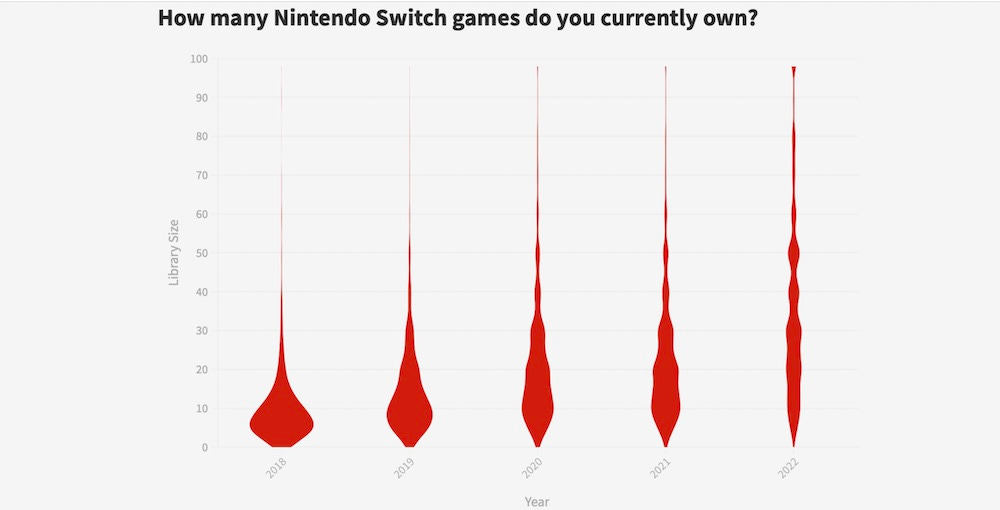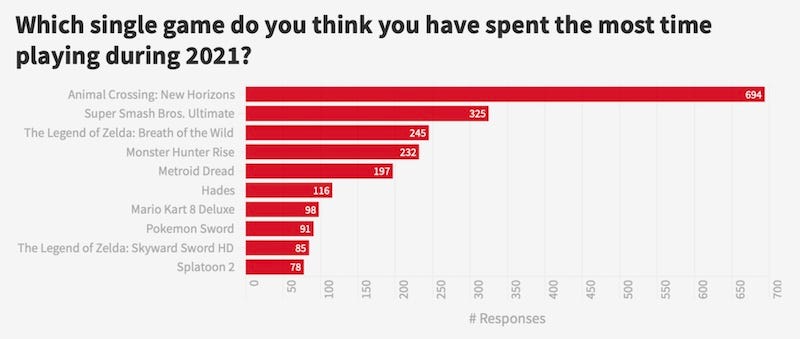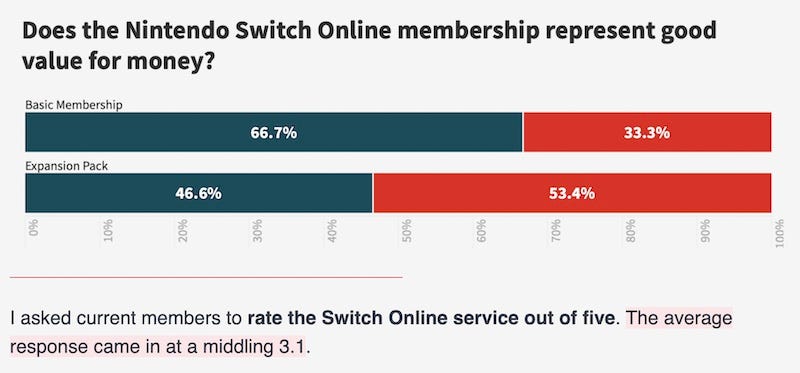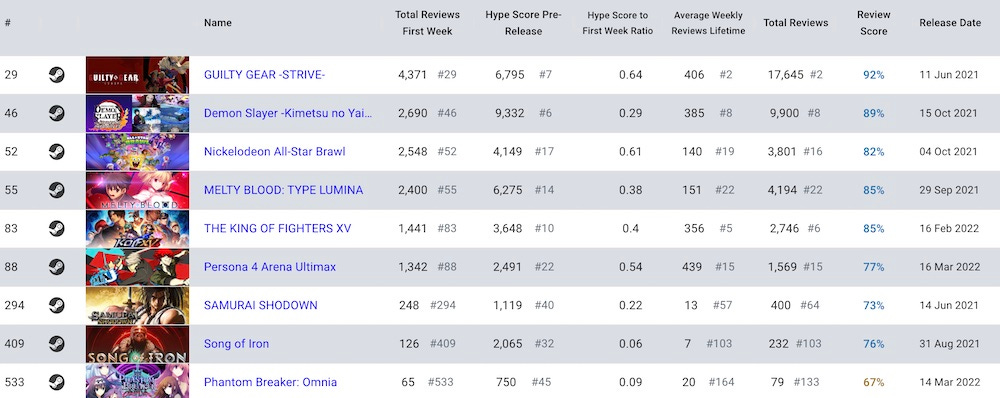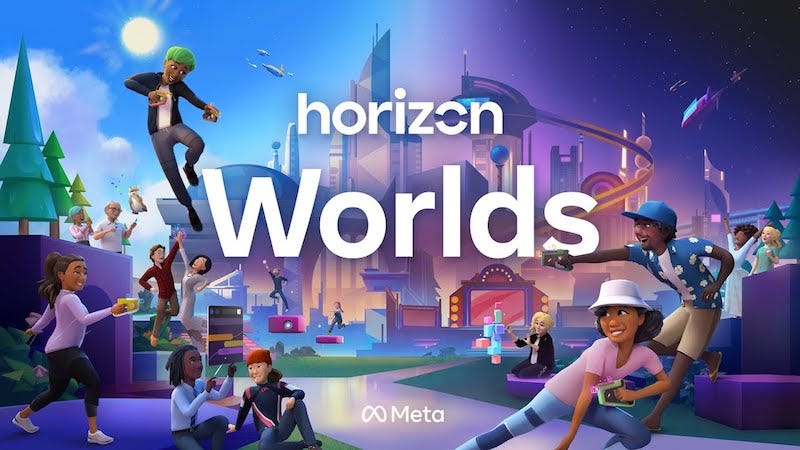Nintendo Switch: the state of player discovery
Publikováno: 13.4.2022
And some deep research from the GameDiscoverCo vaults...
[The GameDiscoverCo game discovery newsletter is written by ‘how people find your game’ expert & company founder Simon Carless, and is a regular look at how people discover and buy video games in the 2020s.]
Good Wednesday to you, fine folks, and welcome to the newsletter of your dreams. If, that is, your dreams consist of reading a lot of charts and analysis in a dense, information-packed format. (Mine do.)
Thanks to all for the kind comments about Monday’s newsletter on Instruments Of Destruction. PSA: if you want to spill your real-world Steam (and console sales by %?) data and insight, whether your game did well or not, our email is always open…
[Help us thrive, and get analysis, data, and peer feedback all at the same time? Our GameDiscoverCo Plus paid sub has a data-rich weekly game trends analysis, interactive Steam ‘Hype’ charts, two eBooks, a member-only Discord & more. Sign up today!]
The state of Switch - what are players up to?
Every year, SwitchWeekly’s Chris Brandrick does a comprehensive survey of Switch players. This year’s has responses from just under 5,000 players - and puts together a gigantic compendium of data on the ‘state of Switch’, including multiple thousands of words of insight.
Obviously, there’s going to be some selection bias in folks filling out a survey like this - likely towards more ‘core’ Switch players. But there’s still a ton of takeaway to be gained from looking at the results. Here are some of the things we spotted:
Looking at the ‘games owned’ chart (above) from 2018 to 2022 - it gives a perfect indication of how Switch libraries have broadened and diluted over time. Chris notes: “the median value here… comes in at 35 games owned. In 2021 the median response was 20 games owned.” (This also pictorially explains why releasing a game in 2018 was way better than, say, this year.)
I’m a little surprised about this stat: “I asked what percentage of Switch owners' libraries was made up of digital titles versus physical - and the figure stands at just over 53% digital.” It hasn’t changed much over the years. I suspect this is partly because players like to buy expensive $60 first-party titles, and would prefer to have physical versions of those. (Also: limited-edition physical games?)
Talking of first-party Nintendo titles: “Pokemon Legends: Arceus was already at 39% ownership [from all those surveyed, and] 50%… picked up 2021 hit Metroid Dread.” Even if this is a ‘core’ demographic answering the questions, those are just spectacular numbers.
And when it comes to what games people have played the most on Switch over the last year? It’s almost all Nintendo, all the time, with the exception of Capcom’s Monster Hunter Rise & Supergiant’s Hades:
To be honest, there’s so much data here, it’s out of control. But summing up some other notable tidbits:
Less than 5% of respondents had bought a cloud version of a Switch game (such as Hitman 3, Marvel's Guardians of the Galaxy, and several Kingdom Hearts games.) But of those who had, 67% would buy them again, whereas 33% would not. In retrospect, that’s probably not an amazing datapoint for cloud.
A slightly eye-opening stat: 42.3% of these particular Switch players had played games from a region other than their own. And although 58.2% of those folks said it was to try a game not available in their own country, 26.5% said it was because a game was cheaper in another country. (That’s maybe.. not good.)
Do players see eShop discounts as negative? “I asked respondents if they thought discounted games being prominently featured on the eShop are a net positive or a net negative to Switch's ecosystem? Over 87% saw this as a positive practice.” So gamers like it. (The question of whether it helps people find good games is still open.)
Finally, there’s a lot of data on Switch Online. For those who signed up, obviously online play (>80%) and the retro emulated titles (69.2%) were the main reasons. But the new Switch Online Expansion Pack (N64, Genesis, Mario Kart/Animal Crossing extras) got more mixed reviews, with only 32.1% of this cohort signing up so far.
Reasons for not signing up to Expansion Pack? Expense, but also not enough extra games, or lack of interest in the N64 library: “I don't have Animal Crossing or Mario Kart, and $50 a year is way too much for some old N64 games.” I don’t think Nintendo has this tier quite right… yet? And overall, it seems like Switch Online has mixed excitement:
Of course, Switch Online being ‘middling’ isn’t bad, while Nintendo continues to sell many millions of copies of its core titles at $60 each. Every year. Impressively.
But if you think about where Game Pass is, and PlayStation Plus is trying to get to, it does feel like Nintendo will have to get a little more aggressive at some point. But the company often defies gravity - so honestly, who even knows?
Thanks again to Chris for this stellar work. BTW, he says: “If you enjoy this please consider.. subscribing to my free weekly Nintendo newsletter, joining the Switch Weekly community by becoming a patron, or even chucking me a few bucks by buying me a coffee.”
Analysis: which Steam genres convert the best?
As part of our regular analysis of the Steam marketplace, GameDiscoverCo has been going even deeper into performance results for Steam tags. We calculate a ‘Hype score’ before release - based on follower, wishlist, and other counts - for all unreleased games on the service. (Plus subscribers can see, browse and sort this, btw!)
And since we also track # of Steam reviews in a game’s first week, we can produce a ‘Hype score to first week’ number - the rough median being 0.15. Now we’re experimenting with an interesting question: are there particular Steam tags which produce better conversion rates than others?
The numbers are ‘not ready for prime time’, as we work with a client on ‘em. But here’s some initial conclusions we’re able to share:
Some of the highest-ranked tags are tempting, but tricky to enter: for example, ‘2D fighter’ has a 70% better conversion than median. But if you look at the ‘notable’ games released in the last year using our data (above), you’ll see long-standing franchises carrying a lot of the weight.
Since Steam tags are often user-generated, some weirdness ensues: for example, Inscryption actually has an FMV tag on it, which boosts that tag to ‘way above average’ in our rankings. But I wouldn’t call it an FMV-centric game… (Steam does tag weighting kung-fu to deal with this more elegantly.)
This only measures relative performance: remember that we’re talking about ‘conversion versus the expected’, not ‘overall performance’, which is quite different! (We’re looking at overall post-release performance soon.) So this is very much ‘did this type of game do better than expected?’
There’s enough data to print a selection of the ‘above average’, ‘average’ and ‘below average’ conversion rates for Steam tags. Looking at games released in the last twelve months:
Above average: 2D fighter, roguelike deckbuilder, MMORPG, sports.
Average: Survival horror, walking sim, interactive fiction, 4x, farming sim.
Below average: City builder, Metroidvania, strategy RPG, puzzle platformer.
A few of these are a little surprising. For example, I recommend city builders and Metroidvania-s as good genres to consider on Steam. So poor conversion for these tags might be eye-opening. (They still do much better than average for ‘median overall revenue’ on Steam, though!)
But I think the results - which suggest those genres convert 50% worse than median - are due to the large amount of titles competing in the space. Metroidvanias have some smash hits like F.I.S.T. (3x median Week 1 conversion), but a whole bunch of titles like Flynn: Son Of Crimson (3x worse than median).
In addition, it may be easy to get people to hit the ‘wishlist’ or ‘follow’ button on genres like Metroidvania or city builder, because they are inherently attractive. But then it may be more difficult to get people to buy, because they’ve wishlisted lots of that subgenre, and have to be picky! There’s a bunch of intriguing possibilities here…
The game discovery news round-up..
And let’s take a final look at the major news in the game platform and discovery space to end out. It’s about trends, not games - because you can get all your ‘game!’ info on a number of other high-class newsletters:
China’s government is now approving video games for domestic distribution again - for the first time since July 2021. This more detailed Reuters report notes: “Sources and analysts said while the timing of the relaxation was unexpected, companies had bent over backwards after facing heavy criticism from authorities for being non-compliant”, and there’s still major turmoil in the space.
In ‘the metaverse will be monetized’ news, Meta will let Horizon Worlds creators sell virtual items, and BI has the math: “If a creator sells an item for $1.00, then the Meta Quest Store fee would be $0.30 and the Horizon Platform fee would be $0.17 (25% of the remainder), leaving $0.53 for the Creator.” Not amazing, though Piers Harding-Rolls points out it’s competitive with Roblox & Minecraft. And Meta notes: “Over time, we plan to bring Horizon Worlds to more platforms and so the platform fee won't always be going to Meta.”
TinyBuild CEO Alex Nichiporchik, who is not known for being a shrinking violet, put up an opinion piece on GI.biz about ‘why review scores are dead’. Some good points - many sandbox-y or GaaS titles don’t really conventionally ‘review’ at all. (Look: janky-adjacent meme games can sell way better than finely crafted niche titles, and janky can still be fun!)
The standalone VR device the Pico Neo 3 (now owned by TikTok parent Bytedance) is launching in Europe shortly. It “will cost €449 with “limited quantities” available. It will first ship in Germany (where Quest 2 isn’t sold), France, Spain and the Netherlands in May. The UK (£399) and Italy will follow in June.” Another VR platform to keep an eye on!
Former U.S. PlayStation chief Jack Tretton, who has a SPAC looking to acquire game companies, made some interesting comments to Axios about some products like PlayStation Vita not having enough first-party spend behind them at the time: “There were certainly technologies that I thought were good but just didn't have the level of support they needed.”
As the Russian game biz gets roiled by the invasion of Ukraine, an App2Top survey reveals an exodus: “17.8% of [game devs] already left Russia [and 24.5% more are planning to leave]. Turkey, Armenia, and Georgia are the most popular destinations. 58.2% paid with their own money… 83.6% of relocated respondents are happy with their decision. However, 75% are planning to get back to Russia when the ‘situation will calm down.’”
PlayStation released its PS5/PS4 monthly ‘top game’ charts across the U.S./Canada and Europe - here’s PS5, here’s PS4 for March - some of the few accurate performance indicators. Notable: Elden Ring dominating, the underdiscussed Gran Turismo 7 having a good launch, lots of ‘evergreen’ sellers like Minecraft and GTA V throughout…
In ‘scary forms of monetization I didn’t know existed’ - a Plus subscriber alerted me to the fact that ubiquituous battle royale PUBG has progressive skins for weapons that can cost up to $1,000 to fully unlock. They’re optional cosmetics, of course, where you layer purchases on top of each other, but wowzers…
Finally, in ‘old discovery’ news, it’s amazing to me that we’re still finding historical footage of vital bits of game history. In this case, it’s Sega’s 1976 arcade game Heavyweight Champion, which looks so much more impressive than I envisioned:

[We’re GameDiscoverCo, an agency based around one simple issue: how do players find, buy and enjoy your premium PC or console game? We run the newsletter you’re reading, and provide consulting services for publishers, funds, and other smart game industry folks.]
